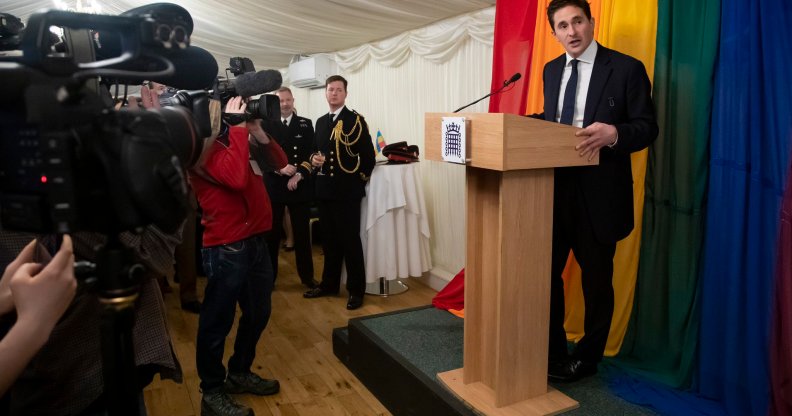British government finally apologises for banning gay people from armed forces, 20 years since ban was lifted

Johnny Mercer delivering an official apology to the LGBT+ soldiers sacked over their sexuality (Twitter)
The UK Ministry of Defence has apologised for an archaic policy that banned gay people from serving in the armed forces 20 years after it was scrapped.
Conservative MP Johnny Mercer, who is also a veteran, apologised for the anti-gay policy in a speech in the Houses of Parliament this week.
“It was unacceptable then and it is unacceptable now,” Mercer said of the policy, which was finally consigned to history in 2000.
Conservative MP Johnny Mercer apologised for anti-gay armed forces policy.
“As the minister for defence, people and veterans, I wanted to personally apologise to you today for those experiences,” he said, Sky News reports.
“If I am honest, it is hard to conceive – as a more contemporary veteran of our armed forces – the environment too many of you experienced when you were serving.
“Where being a member of the LGBT+ community would have got you detained, followed by a dishonourable discharge from the military.
As the minister for defence, people and veterans, I wanted to personally apologise to you today for those experiences.
“Volunteering to serve is an act of bravery in itself; to volunteer for the chaotic, challenging nature of service life and yet within that community, which so many of us are proud of, experience discrimination of this sort is unacceptable.”
The ban was lifted by a Labour government in January 2000 after a number of LGBT+ people took a legal case against the ban with the help of charity Stonewall.
A number of sacked LGBT+ soldiers are seeking compensation for their dismissal.
Under the policy, when a gay member of the armed forces had their sexuality discovered, they were honourably discharged. In some cases, they were also stripped of medals.
By stark contrast, the British Army today specifically aims to recruit LGBT+ soldiers.
In December, The Independent reported that 150 people have sought compensation due to their dismissal from the armed forces based on their sexual orientation.
LGBT+ campaigner Peter Tatchell suggested at the time that the number of people sacked over their sexuality likely runs into thousands – and said the Ministry of Defence should contact all of them.
“The MoD should be contacting all those people to advise them that they are eligible for compensation,” Peter Tatchell said. “In the 1980s, when I was researching military dismissals, the number sacked for their sexuality was between 100 and 300 annually.”

